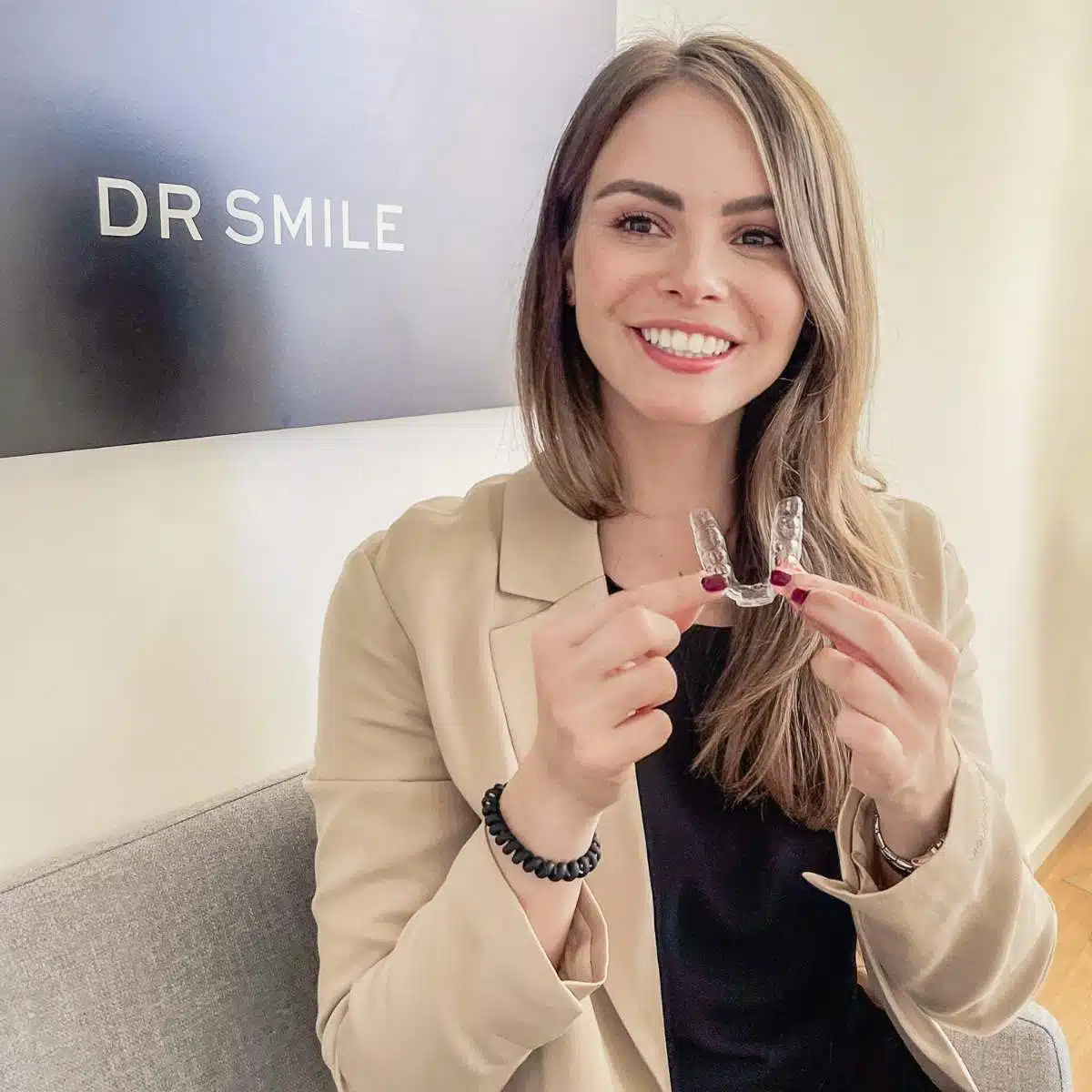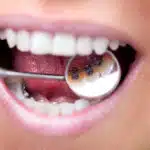Dental care for sensitive teeth: We reveal the best products and give you tips on brushing your teeth, nutrition and more.
Sensitive teeth can have a significant impact on everyday life. Whether it’s hot drinks, cold ice cream or sweet foods – anyone who suffers from sensitive teeth knows the unpleasant pulling sensation that such stimuli can cause.
The good news is that with the right dental care, you can reduce sensitivity and give your teeth the support they need.
In this article, you will find out what causes sensitive teeth, which products really help and how to optimize dental care for sensitive teeth.
| Get 150 € discount on your dental correction! |

Book a consultation appointment now at a nearby DrSmile partner practice and find out if teeth straightening with aligners is right for you.
The appointment is completely non-binding and does not involve any costs.
With the code “THATSMILE150” you will receive 150 € discount on the treatment.
What causes sensitive teeth?
Sensitive teeth are often caused by exposure of the dentin, which contains nerve tubules. The most common causes are
- Brushing your teeth incorrectly: If you brush with too much pressure or a toothbrush with hard bristles, the enamel can gradually be worn away. This results in sensitive areas, particularly at the gum line.
- Tooth erosion: Consuming acidic foods such as citrus fruits, soft drinks or sour sweets can soften tooth enamel. If you brush your teeth immediately after eating them, the weakened enamel will be further eroded.
- Gum recession: Often caused by inflammation of the gums (gingivitis) or periodontitis. Receding gums expose the sensitive tooth necks, which are susceptible to irritation.
- Teeth grinding: If you clench or grind your teeth at night, this puts extreme strain on the tooth enamel. This not only wears down the teeth, but also makes them more sensitive to external influences.
- Dental treatments: Teeth can temporarily react sensitively after professional teeth cleaning, bleaching or other dental procedures.

The best products for sensitive teeth
Choosing the right products plays a crucial role if you want to care for sensitive teeth effectively.
Many specially developed dental care products aim to reduce sensitivity to pain, strengthen the enamel and protect the gums at the same time.
It is important that you use products that clean gently and are tailored to the specific needs of your teeth.
1. toothpastes for sensitive teeth
Special toothpastes contain ingredients such as potassium nitrate or strontium chloride, which reduce nerve sensitivity, as well as fluoride to strengthen tooth enamel.
Our recommendation: Use fluoride-containing toothpastes that are explicitly labeled for sensitive teeth.
2. mouthwashes for additional protection
Mouthwashes with fluoride strengthen the enamel and reduce the risk of tooth erosion.
Products without alcohol are gentler on the gums and ideal for sensitive teeth.
3. toothbrushes with soft bristles
Soft bristles clean the teeth thoroughly without damaging the enamel or gums.
Electric toothbrushes with pressure sensors can also help to ensure gentle cleaning.
4. enamel-building products
Some products contain hydroxyapatite or other remineralizing substances that help to repair the enamel and strengthen the teeth.
| Get 150 € discount on your dental correction! |

Book a consultation appointment now at a nearby DrSmile partner practice and find out if teeth straightening with aligners is right for you.
The appointment is completely non-binding and does not involve any costs.
With the code “THATSMILE150” you will receive 150 € discount on the treatment.
Tips for dental care for sensitive teeth
- Use the right brushing technique
Brush your teeth with gentle, circular movements and avoid applying too much pressure. Make sure you clean all tooth surfaces thoroughly without damaging the enamel. - Wait after eating acidic foods
You should wait at least 30 minutes after consuming acidic foods or drinks such as orange juice before brushing your teeth. This will prevent further damage to the enamel surface. - Avoid tooth whitening products
Many whitening products contain abrasives or aggressive chemicals that can damage tooth enamel. Experience has shown that they are safe to use or your dentist recommends them. - Using fluoride
Fluoride protects teeth from decay and strengthens tooth enamel. Regular use of toothpaste and mouthwash is particularly important. - Seek dental advice
If your teeth remain sensitive despite all measures, you should see your dentist. They can determine whether, for example, fillings or other treatments are necessary.

Home remedies for sensitive teeth
In addition to proper dental care, you can also soothe sensitive teeth with these home remedies:
- Sage tea: Sage tea has anti-inflammatory and soothing properties. Rinse your mouth several times a day with cooled, freshly brewed sage tea. This strengthens the gums and reduces sensitivity.
- Coconut oil pulling: Coconut oil has antibacterial properties. Oil pulling involves putting a tablespoon of coconut oil in your mouth and swishing it around for 10-15 minutes. This can help to reduce bacteria and promote oral health.
- Enamel-friendly diet: Avoid excessively acidic foods and instead include cheese, dairy products and green vegetables such as broccoli in your diet. These promote the remineralization of tooth enamel and strengthen the teeth from the inside.
- Aloe vera: Fresh aloe vera juice can be applied to the gums to soothe and protect sensitive areas.
- Clove oil: Clove oil is a tried and tested household remedy for dental problems. Apply it carefully to sensitive areas with a cotton bud to relieve pain.

A brief summary on the subject of dental care for sensitive teeth
Sensitive teeth can affect your quality of life, especially if you have to give up your favorite foods.
However, with the right care, the right products and regular visits to the dentist, you can do a lot to reduce sensitivity and do something good for your teeth in the long term.
Your dental health is in your hands – start adjusting your routine today and get the smile you deserve!
| Get 150 € discount on your dental correction! |

Book a consultation appointment now at a nearby DrSmile partner practice and find out if teeth straightening with aligners is right for you.
The appointment is completely non-binding and does not involve any costs.
With the code “THATSMILE150” you will receive 150 € discount on the treatment.
Frequently asked questions about dental care for sensitive teeth
Finally, we answer a few of the most frequently asked questions about dental care for sensitive teeth.
Why are my teeth sensitive?
Sensitive teeth are often caused by exposed dentin, which protects the nerves in the teeth. This can be caused by enamel loss due to incorrect brushing, an acidic diet, teeth grinding or gum recession.
Which toothpaste helps with sensitive teeth?
A toothpaste for sensitive teeth should contain ingredients such as potassium nitrate or strontium chloride, which reduce sensitivity to pain. It should also contain fluoride to strengthen the tooth enamel.
Can I treat sensitive teeth myself?
Yes, you can often reduce sensitivity with the right dental care. This includes special toothpastes, gentle brushing and avoiding abrasive products. However, you should see your dentist if the symptoms persist.
Are electric toothbrushes suitable for sensitive teeth?
Yes, electric toothbrushes with soft brush heads and pressure sensors are ideal. They clean thoroughly and gently without damaging the enamel or gums.
How can I adapt my diet to protect sensitive teeth?
Avoid acidic foods such as soft drinks and citrus fruits. Instead, you can include enamel-friendly foods such as cheese, dairy products and green vegetables in your diet to strengthen your tooth enamel.
Does fluoride really help with sensitive teeth?
Yes, fluoride strengthens tooth enamel and protects teeth from decay and erosion. Toothpastes and mouthwashes containing fluoride are particularly effective for sensitive teeth.
What should I bear in mind when brushing my teeth?
Use a toothbrush with soft bristles and brush with gentle, circular movements. Avoid applying too much pressure, as this can damage the enamel and gums.
Which mouthwash is suitable for sensitive teeth?
A mouthwash for sensitive teeth should contain fluoride and be alcohol-free. It strengthens the tooth enamel, soothes the gums and protects the teeth from further irritation.
Can home remedies help with sensitive teeth?
Yes, home remedies such as sage tea or coconut oil pulling can soothe the gums and support oral health. However, they should not replace long-term dental care, but rather supplement it.
When should I see a dentist if I have sensitive teeth?
If the sensitivity of your teeth persists or increases despite special care, you should consult a dentist. Exposed tooth necks or other dental problems may be the cause and need to be treated professionally.



Leave a Reply